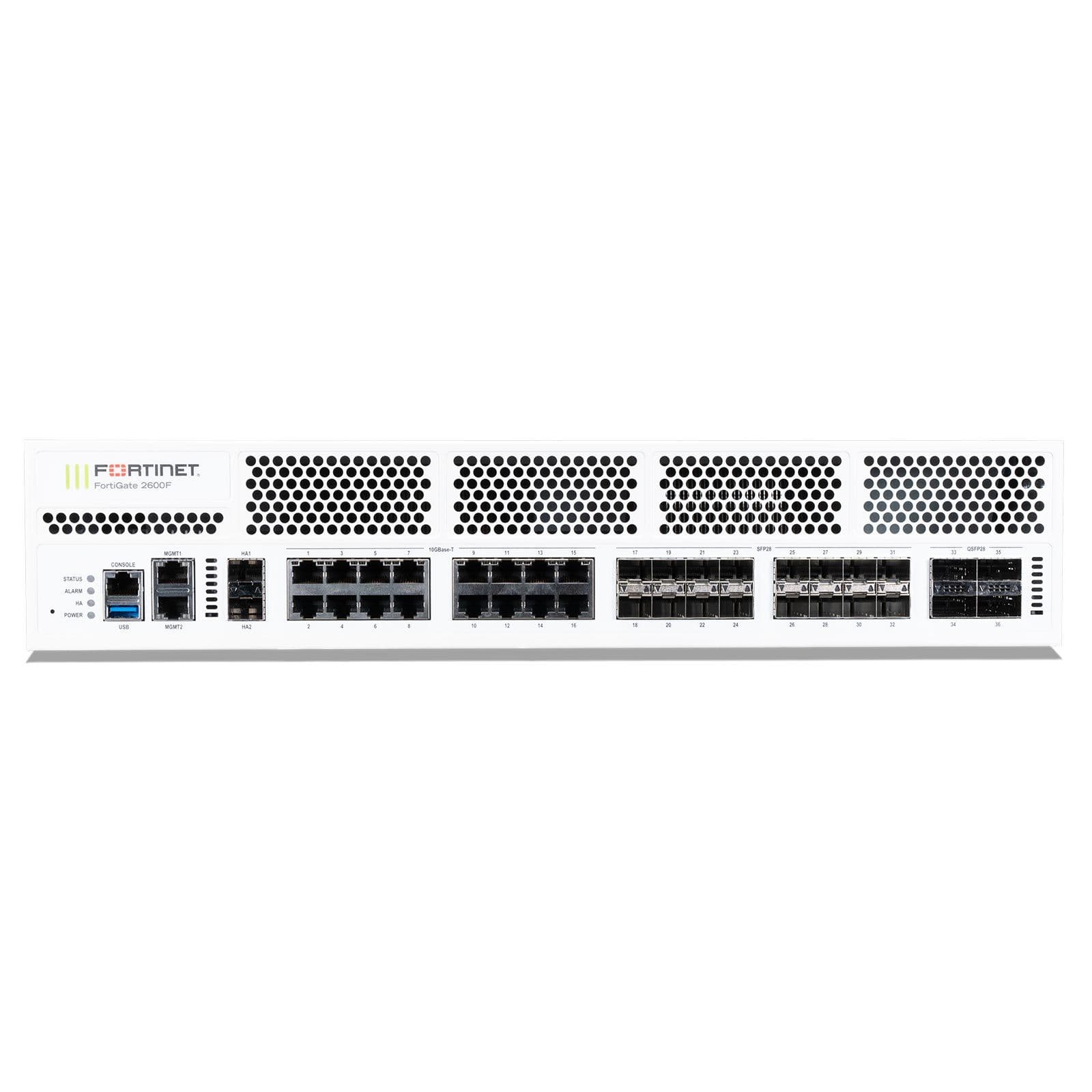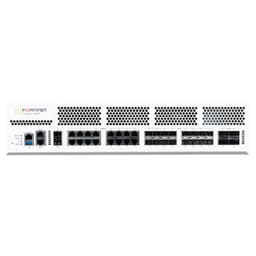FortiGate FG-2600F: Ultra-High Performance Network Security for Large Enterprises

Category :Firewall
Fortinet FortiGate 2600F Review : NGFW Firewall Built for the Modern Enterprise
The FortiGate 2600F Series is a high-performance next-generation firewall (NGFW) designed for large enterprises and service providers, delivering industry-leading throughput of up to 198 Gbps (firewall) and 55 Gbps IPsec VPN performance via Fortinet’s SPU hardware acceleration (NP7/CP9 chips), ensuring low-latency SSL/TLS 1.3 inspection and threat protection (25 Gbps with AI/ML-driven FortiGuard Services). Its extensive connectivity includes 4×100/40 Gbps QSFP28 slots, 16×25/10 Gbps SFP28 ports, and 16×10 Gbps RJ45 interfaces, supporting hyperscale demands (24M sessions, 1M CPS) for data centers or 5G/IoT environments, with dual AC/DC power options.
Advanced security integrates Zero Trust (ZTNA), VXLAN segmentation, Secure SD-WAN, and real-time defenses against ransomware and zero-day exploits, while AI-powered automation streamlines threat response. Ideal for hybrid cloud cores, remote workforce VPNs, and GTP-U/CGNAT-secured mobile traffic, the 2600F offers flexible licensing (FortiCare Premium, FortiGuard Enterprise) but starts at ~$42,000 (hardware only), with costs rising for bundled services and optional 2TB NVMe storage (2601F variant). Though complex for smaller teams, its scalability, unified security, and Gartner-recognized leadership make it a future-proof investment for enterprises prioritizing hyperscale performance and compliance.

Fortinet FortiGate Firewall Throughput 198 Gbit/s
The Fortinet FortiGate 2600F Network Security Firewall delivers a firewall throughput of 198 Gbit/s, which refers to the maximum rate at which the firewall can process network traffic while applying basic firewall policies. This high throughput capability enables the FortiGate 2600F to support large-scale network environments by allowing a significant volume of data to pass through the firewall without introducing latency or performance degradation. It ensures that the firewall can handle vast amounts of traffic efficiently, making it suitable for data centers, large enterprises, and service provider environments that demand high-performance security infrastructure.
Fortinet FortiGate IPS Throughput 31 Gbps
The Fortinet FortiGate 2600F Network Security Firewall offers an IPS (Intrusion Prevention System) throughput of 31 Gbps. This metric represents the maximum data rate at which the device can analyze and protect against intrusion attempts and security threats across the network. With 31 Gbps IPS throughput, the FortiGate 2600F can effectively inspect network traffic in real-time for signs of malicious activity, such as malware, exploits, and vulnerabilities, ensuring that any potential threats are quickly identified and blocked.
This high throughput ensures the firewall can maintain robust security without compromising network performance, making it ideal for large enterprises or high-traffic environments where advanced security measures are essential.
Fortinet FortiGate NGFW Throughput 27 Gbps
The Fortinet FortiGate 2600F Network Security Firewall offers a Next-Generation Firewall (NGFW) throughput of 27 Gbps. This indicates the device's ability to provide advanced, application-aware security at a high data rate. The NGFW capability of the FortiGate 2600F integrates traditional firewall protection with additional features like deep packet inspection, application control, intrusion prevention, and more. With 27 Gbps throughput, it can effectively process and inspect network traffic for security threats, ensuring that malicious applications or unauthorized network activity are swiftly detected and blocked. This makes the FortiGate 2600F suitable for enterprises or data centers that require high-performance security with the ability to secure complex network environments.
Fortinet FortiGate Threat Protection Throughput 25 Gbps
The Fortinet FortiGate 2600F Network Security Firewall provides a Threat Protection throughput of 25 Gbps. This means that the device is capable of inspecting and filtering network traffic at high speeds to protect against various types of security threats, such as malware, ransomware, and other malicious activities. With a throughput of 25 Gbps, the FortiGate 2600F can process large volumes of data while providing effective protection against known and unknown threats. This ensures that the firewall can handle heavy network traffic without compromising on security, making it ideal for enterprises or large organizations that require robust and scalable threat protection for their networks.
Fortinet FortiGate VPN Supported 30,000
The Fortinet FortiGate 2600F Network Security Firewall supports up to 30,000 VPN connections. This means that the firewall can handle a large number of secure, encrypted communications simultaneously, making it ideal for large enterprises, data centers, or organizations with many remote users or branch offices. With support for such a high number of VPN connections, it ensures that businesses can maintain secure, reliable, and scalable connections across their networks without sacrificing performance. This feature is essential for businesses that rely on secure site-to-site or remote access VPNs for their day-to-day operations, enabling them to expand their network securely while maintaining optimal performance.
-3.jpg%3F2025-04-11T07%3A18%3A12.617Z&w=3840&q=75)
Fortinet FortiGate Secure SD-WAN
Fortinet FortiGate Secure SD-WAN delivers advanced WAN edge capabilities by integrating networking and security functions into a single operating system and unified management framework. It transforms and secures WAN connections, offering consistent protection and control across the network. This solution ensures high-quality user experience and strong security for hybrid work models, SD-Branch environments, and cloud-first WAN deployments. It also supports operational efficiency at any scale through automation, in-depth analytics, and self-healing capabilities.
Fortinet FortiGate FortiGuard AI-Powered Security Services
FortiGuard AI-Powered Security Services are integrated into Fortinet’s FortiGate NGFWs and other products, forming part of a layered defense approach. These services are equipped with the latest threat intelligence from FortiGuard Labs, providing protection against modern attack vectors, including zero-day threats and advanced AI-powered attacks.
Fortinet FortiGate Network and File Security
FortiGuard’s network and file security services protect against both network and file-based threats. Featuring over 18,000 signatures, the intrusion prevention system (IPS) uses AI and machine learning models for deep packet and SSL inspection. This system detects and blocks malicious content while applying virtual patches for newly discovered vulnerabilities. The multi-layered anti-malware protection defends against both known and unknown file-based threats by combining antivirus and sandboxing. Application control enhances security compliance and provides real-time visibility into application usage.
Fortinet FortiGate Web/DNS Security
FortiGuard’s Web/DNS security services protect against DNS-based attacks, malicious URLs (including those within emails), and botnet communications. The DNS filtering service blocks a wide range of DNS-based attacks, while URL filtering uses a vast database of over 300 million URLs to identify and block malicious links. Additionally, IP reputation and anti-botnet services provide protection against botnet activity and DDoS attacks. FortiGuard Labs blocks over 500 million malicious, phishing, and spam URLs each week and prevents 32,000 botnet command-and-control attempts every minute.
Fortinet FortiGate SaaS and Data Security
FortiGuard offers comprehensive SaaS and data security services that address key application security needs and protect data. These services include data loss prevention, ensuring the visibility, management, and protection of data in motion across networks, clouds, and users. The inline cloud access security broker service protects data in motion, at rest, and in the cloud, enforcing compliance standards and managing account, user, and cloud application usage. Additionally, these services assess infrastructure, validate configurations, and highlight risks, including IoT device detection and vulnerability correlation.
Fortinet FortiGate Zero-Day Threat Prevention
FortiGuard provides zero-day threat prevention through AI-powered inline malware prevention. This service analyzes file content to identify and block unknown malware in real time, providing sub-second protection across all FortiGate NGFWs. It also integrates the MITRE ATT&CK matrix, accelerating investigation efforts. The service streamlines incident response, blocks unknown threats, and reduces security overhead, offering a comprehensive defense.
Fortinet FortiGate OT Security
With over 1,000 virtual patches, 1,100+ OT applications, and more than 3,300 protocol rules, FortiGuard’s OT security capabilities are integrated into FortiGate NGFWs to detect threats targeting operational technology (OT) infrastructure. These capabilities include vulnerability correlation, virtual patching, and the use of industry-specific protocol decoders for robust defense against OT threats and devices.

Fortinet FortiGate FortiOS
FortiOS is the real-time network security operating system developed by Fortinet, serving as the foundation for the Fortinet Security Fabric platform. It enables the enforcement of security policies and provides holistic visibility across the entire attack surface. FortiOS offers a unified framework for managing and securing a variety of network environments, including cloud-based, hybrid, and integrated IT, OT, and IoT infrastructures. This operating system allows seamless and efficient interoperation across Fortinet products, offering AI-powered protection for hybrid environments.
Unlike traditional point solutions, Fortinet adopts a holistic cybersecurity approach with FortiOS. This strategy aims to reduce complexities, eliminate security silos, and improve operational efficiencies. By consolidating security functions into a single platform, FortiOS simplifies management, reduces costs, and enhances the overall security posture of organizations. Together with FortiGate, FortiOS provides intelligent, adaptive protection, helping businesses minimize complexity, eliminate security silos, and optimize user experience.
FortiOS is also enhanced with generative AI (GenAI), which improves the system's ability to analyze network traffic and threat intelligence. This integration allows FortiOS to detect deviations or anomalies more effectively, providing precise remediation recommendations. It ensures that performance impact remains minimal while maintaining robust security protections.
Fortinet FortiGate Network Processor NP7
Network processors operate in line to deliver unmatched performance and scalability for critical network functions. Fortinet’s breakthrough SPU NP7 works in line with FortiOS functions to deliver:
• Hyperscale firewall, accelerated session setup, and ultra-low latency
• Industry-leading performance for VPN, VXLAN termination, hardware logging, and elephant flows
Fortinet FortiGate Content Processor CP9
Content processors act as co-processors to offload resource-intensive processing of security functions. The ninth generation of the Fortinet Content Processor, the CP9, accelerates resource-intensive SSL (including TLS 1.3) decryption and security functions while delivering:
• Pattern matching acceleration and fast inspection of real-time traffic for application identification
• IPS pre-scan/pre-match, signature correlation offload, and accelerated antivirus processing
Fortinet FortiGate FortiManager
FortiManager, powered by FortiAI, is a centralized management solution for the Fortinet Security Fabric. It streamlines mass provisioning and policy management for FortiGate, FortiGate VM, cloud security, SD-WAN, SD-Branch, FortiSASE, and ZTNA in hybrid environments. Additionally, FortiManager provides real-time monitoring of the entire managed infrastructure and automates network operation workflows. Leveraging GenAI in FortiAI, it further enhances Day 0–1 configurations and provisioning, and Day N troubleshooting and maintenance, unlocking the full potential of the Fortinet Security Fabric and significantly boosting operational efficiency.
Why we choose this 2600F Firewall ?
We chose the FortiGate 2600F because it is a high-performance next-generation firewall tailored for the modern enterprise, offering exceptional scalability, security, and speed. It delivers up to 198 Gbps firewall throughput and 55 Gbps IPsec VPN performance using Fortinet’s SPU NP7 and CP9 hardware acceleration chips, which ensures ultra-low latency and robust inspection capabilities, including SSL/TLS 1.3 and AI-powered threat protection at 25 Gbps. This makes it ideal for high-demand environments like data centers, large enterprises, and 5G/IoT deployments.
With support for up to 30,000 VPN connections, Secure SD-WAN, Zero Trust (ZTNA), advanced segmentation (VXLAN), and comprehensive FortiGuard AI-driven security services—including network, file, DNS, SaaS, and OT threat protection—the 2600F offers a complete and adaptive defense framework. Its hardware includes high-speed connectivity with 4×100/40 Gbps QSFP28, 16×25/10 Gbps SFP28, and 16×10 Gbps RJ45 ports, while dual AC/DC power options enhance its resilience.
Powered by FortiOS, Fortinet’s unified security platform, and managed centrally with FortiManager (enhanced by FortiAI and GenAI), it simplifies policy orchestration, real-time monitoring, and zero-touch provisioning. Despite a higher upfront cost, its unmatched throughput, layered defenses, and automation make the FortiGate 2600F a future-proof solution that empowers organizations to scale securely, respond quickly to threats, and reduce operational complexity across hybrid environments.
get in touch
Have A project in? Let's talks










.jpg&w=256&q=75)

